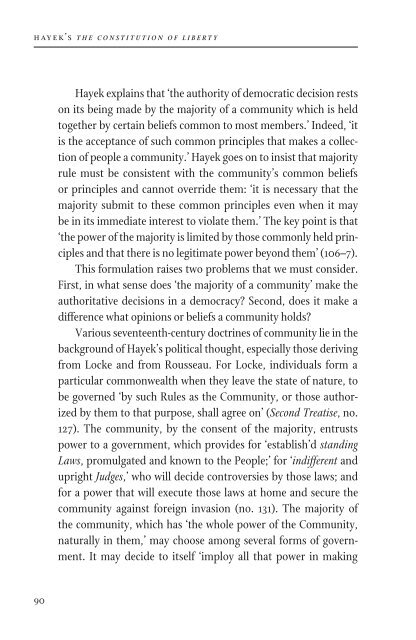Hayek's The Constitution of Liberty - Institute of Economic Affairs
Hayek's The Constitution of Liberty - Institute of Economic Affairs
Hayek's The Constitution of Liberty - Institute of Economic Affairs
Create successful ePaper yourself
Turn your PDF publications into a flip-book with our unique Google optimized e-Paper software.
h ay e k ’ s t h e c o n s t i t u t i o n o f l i b e r t y<br />
m a j o r i t y r u l e a n d l i m i t e d g o v e r n m e n t<br />
Hayek explains that ‘the authority <strong>of</strong> democratic decision rests<br />
on its being made by the majority <strong>of</strong> a community which is held<br />
together by certain beliefs common to most members.’ Indeed, ‘it<br />
is the acceptance <strong>of</strong> such common principles that makes a collection<br />
<strong>of</strong> people a community.’ Hayek goes on to insist that majority<br />
rule must be consistent with the community’s common beliefs<br />
or principles and cannot override them: ‘it is necessary that the<br />
majority submit to these common principles even when it may<br />
be in its immediate interest to violate them.’ <strong>The</strong> key point is that<br />
‘the power <strong>of</strong> the majority is limited by those commonly held principles<br />
and that there is no legitimate power beyond them’ (106–7).<br />
This formulation raises two problems that we must consider.<br />
First, in what sense does ‘the majority <strong>of</strong> a community’ make the<br />
authoritative decisions in a democracy? Second, does it make a<br />
difference what opinions or beliefs a community holds?<br />
Various seventeenth-century doctrines <strong>of</strong> community lie in the<br />
background <strong>of</strong> Hayek’s political thought, especially those deriving<br />
from Locke and from Rousseau. For Locke, individuals form a<br />
particular commonwealth when they leave the state <strong>of</strong> nature, to<br />
be governed ‘by such Rules as the Community, or those authorized<br />
by them to that purpose, shall agree on’ (Second Treatise, no.<br />
127). <strong>The</strong> community, by the consent <strong>of</strong> the majority, entrusts<br />
power to a government, which provides for ‘establish’d standing<br />
Laws, promulgated and known to the People;’ for ‘indifferent and<br />
upright Judges,’ who will decide controversies by those laws; and<br />
for a power that will execute those laws at home and secure the<br />
community against foreign invasion (no. 131). <strong>The</strong> majority <strong>of</strong><br />
the community, which has ‘the whole power <strong>of</strong> the Community,<br />
naturally in them,’ may choose among several forms <strong>of</strong> government.<br />
It may decide to itself ‘imploy all that power in making<br />
Laws for the Community from time to time, and Executing those<br />
Laws by Officers <strong>of</strong> their own appointing.’ In this case, ‘the Form<br />
<strong>of</strong> the Government is a perfect Democracy.’ <strong>The</strong> majority may,<br />
however, choose from other forms: an oligarchy, consisting <strong>of</strong> ‘a<br />
few select Men, and their Heirs or Successors;’ a monarchy, either<br />
hereditary or elected; or some mixed form <strong>of</strong> government that is<br />
compounded from these (no. 132). <strong>The</strong> point is that majority rule<br />
may occur at either <strong>of</strong> two levels: the majority’s decision as to the<br />
form <strong>of</strong> government (which need not be a democracy); and the<br />
majority’s exercise <strong>of</strong> political power (if it decides to institute a<br />
democratic form).<br />
Rousseau’s innovation is to insist that the community must<br />
retain the lawmaking power and not delegate it to others. What<br />
can be delegated is only the power <strong>of</strong> government or the executive<br />
power (see On the Social Contract, II: 1–6). Like Rousseau, Hayek<br />
distinguishes sharply between lawmaking and governing. He<br />
also commends Rousseau for understanding that the laws must<br />
always be general in form (194; also Hayek, 1992: 251–2). Hayek is<br />
highly critical, however, <strong>of</strong> other teachings <strong>of</strong> Rousseau, including<br />
his insistence that law is an act <strong>of</strong> will by the community (Hayek,<br />
1973: 25; cf. 1976: 147).<br />
More recent majoritarian conceptions <strong>of</strong> democracy <strong>of</strong>fer still<br />
another way to understand majority rule. Unlike Rousseau, these<br />
conceptions assign legislative power to a representative legislature,<br />
but hold that the elected representatives should enact the<br />
specific policies favoured by a majority <strong>of</strong> the community. <strong>The</strong><br />
people’s representatives make the law (presumably by a majority<br />
vote), but the law’s direction is determined by majority opinion in<br />
the community.<br />
In Hayek’s case, one must decide whether he is speaking<br />
90<br />
91












